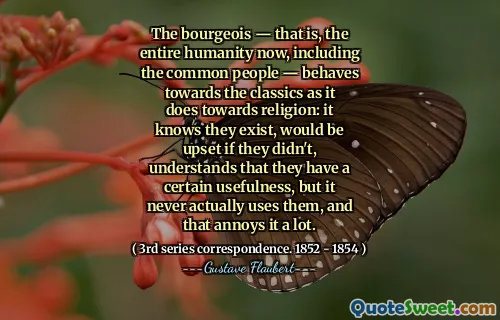
The bourgeois — that is, the entire humanity now, including the common people — behaves towards the classics as it does towards religion: it knows they exist, would be upset if they didn't, understands that they have a certain usefulness, but it never actually uses them, and that annoys it a lot.
This quote by Gustave Flaubert provides a profound commentary on the relationship between society's mainstream class—the bourgeois—and culture or tradition. Flaubert highlights a paradoxical attitude: society recognizes the importance and value of classical works and religious doctrines but often treats them as mere symbols of tradition rather than living principles to be engaged with actively. Such a passive acknowledgment can be seen as a form of cultural inertia, where the familiarity and comfort of tradition are preserved in consciousness but not in practice. The bourgeoisie, representing the common people and middle class, appears to externalize its relationship to classical culture with a sense of obligation rather than genuine interest or reverence. They keep these elements at arm's length, possibly because they challenge or complicate their modern, pragmatic lifestyle. It reflects a broader societal behavior where institutions or ideas are maintained out of habit or for appearances, rather than from authentic conviction—the familiarity simply






